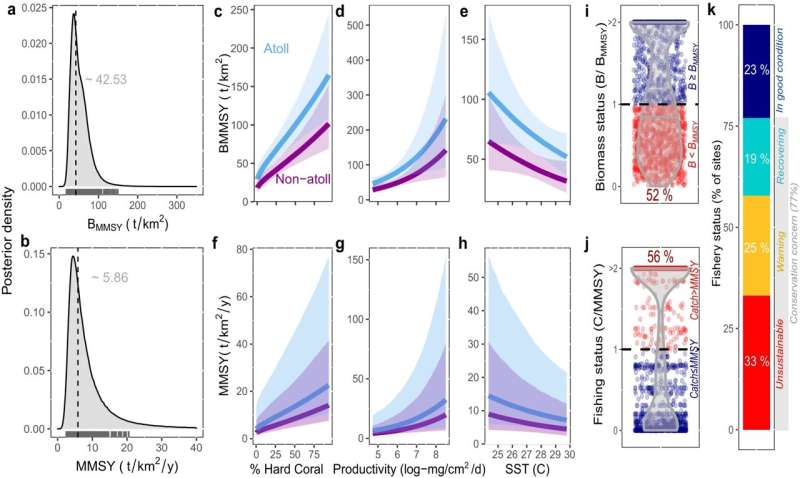This article has been reviewed according to Science X's editorial process and policies. Editors have highlighted the following attributes while ensuring the content's credibility:
fact-checked
peer-reviewed publication
proofread
Calculations by researchers show nearly two-thirds of all coral reefs are overfished

An international team of researchers has used an extensive dataset of more than 2,000 coral reef sites to determine how fish populations and diversity of fish species are faring on the world's ocean reefs. One finding of the study, recently published in Nature Communications, is that nearly two-thirds of the sites studied are overfished below reference points aimed at maximizing catch.
Fishing has been going on in coral reefs for thousands of years. As a richly structured and particularly biodiverse ecosystem, reefs provide a habitat for a number of fish species—including many edible fish. In most cases, traditional artisanal fishing is practiced by the inhabitants of the reef atolls or coasts fringed by reefs. The catch is largely traded informally, bartered or consumed by the people themselves.
This scenario conjures up images of a way of life in harmony with nature. But how sustainable are global coral reef fisheries really and what is the state of fish stocks in coral reefs? Due to the artisanal and rather informal nature of the fishery, the data on this is very scarce. In particular, there is a lack of time series, which are typically used to assess the status of a fishery.
An international team led by Jessica Zamborain-Mason of Harvard University and including reef ecologist Sebastian Ferse of the Leibniz Centre for Tropical Marine Research (ZMT) used a new approach to determine the status of fish populations and species diversity in the world's coral reefs based on an extensive dataset of fish observations.
It is estimated that around six million people are involved in reef fisheries worldwide. Catch from reefs accounts for a significant proportion of total marine fisheries in many regions, the highest being in the Middle East with 43% and the Caribbean with 40%. Reefs provide a great wealth of catchable fish species: snappers, groupers, rabbitfish, parrotfish, wrasses, and surgeonfish are just a few examples.
The scientists used a dataset of fish observations, environmental conditions and management status from over 2,000 reefs worldwide for their study. Fishes were counted and species identified underwater along defined areas known as transects. Data on local fisheries were reconstructed using national statistics.
Using models from fisheries biology, the researchers determined "sustainable reference points" for the respective sites: how high would the maximum yield be if fishing were sustainable, and how large would the biomass of the fish stocks in the reef have to be to achieve this yield. Particularly isolated and fully protected sites that were not fished were used to determine the productivity of the fish community, taking into account environmental conditions such as water temperature or coral cover. By comparing this data, the study's authors were then able to determine the extent to which exploited coral reef sites were overfished.
"This large-scale study provides, for the first time, insight into the state of fisheries on reefs worldwide, which was previously not possible due to a lack of data on this scale," said Sebastian Ferse, one of the co-authors of the publication. "At nearly two-thirds of the sites, fishing removes more than the stocks can replenish in biomass—so there is overfishing."
The fish stocks in almost every tenth reef fished had already collapsed. They had less than ten percent of the biomass that the reef would have according to the model if no fish were caught there. The study also highlights the importance of individual environmental factors. At sites with higher water temperatures and lower coral cover, the maximum sustainable fishing yield was significantly lower. "However, these are the environmental conditions that reefs worldwide are already heading toward due to climate change," Ferse said.
The researchers collected other data as well, such as species diversity, the presence of large predatory fish and the activity of parrotfish, which scrape off algal growth on the reef, creating open areas for coral larvae to settle. This allowed the team to assess how certain fisheries management measures affect other ecosystem processes.
Today, nearly two-thirds of all reefs worldwide are located less than thirty minutes from human settlement, and only a fraction are in successfully managed protected areas. Southeast Asia, in particular, is home to a large number of people involved in reef fisheries. Accordingly, the proportion of unsustainably fished reefs is particularly high there. Reefs in the Persian Gulf and parts of the Caribbean also contain many sites were overfishing is taking place.
But Ferse also offers hope: "It is not necessary to ban fishing from the reef entirely to save the ecosystem. The models show that improved fisheries management and reducing fisheries to 80% of the maximum sustainable yield already lead to significant stock relaxation and more biodiversity." Environmental and societal goals must be carefully weighed, he said, and ultimately the best possible trade-offs sought under local circumstances.
"The model developed in this study can in principle be applied to any reef, under consideration of local conditions," Ferse added. "Thus, it allows for the development of tailored management approaches that take into account both fisheries and ecological goals."
More information: Jessica Zamborain-Mason et al, Sustainable reference points for multispecies coral reef fisheries, Nature Communications (2023). DOI: 10.1038/s41467-023-41040-z
Journal information: Nature Communications
Provided by Leibniz-Zentrum für Marine Tropenforschung (ZMT)




















